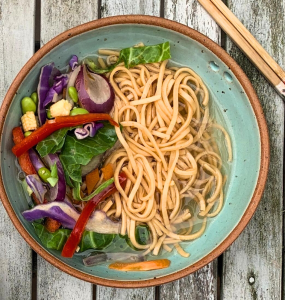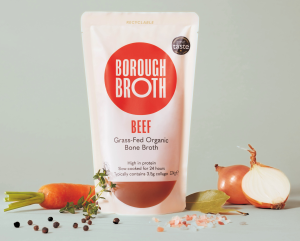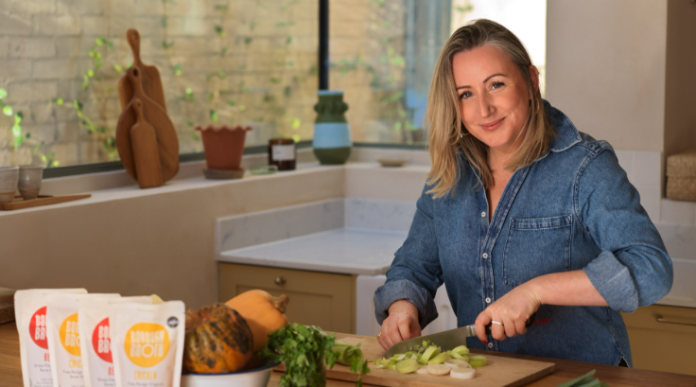Interview with Ros Heathcote, above, Founder and CEO of Borough Broth
From data analytics at Coca-Cola to hand-packing organic bone broth in a rented East London kitchen, Ros Heathcote has proven that you don’t need a business degree to build a thriving food brand, just a strong gut instinct, literal and figurative. We sat down with her to talk resilience, risk, and why organic food is the future for ethical entrepreneurs.
Q: Tell us where the idea for Borough Broth came from. Was there a lightbulb moment?
Yes, there really was. I’d started making bone broth at home after being advised to focus on gut health in my 30s, when I suddenly developed allergies. It wasn’t unfamiliar, I grew up on homemade chicken soup. My great grandmother had given my grandmother a recipe which ended up with me, so it felt like a natural return to something comforting and nourishing.
Then one day I was chatting to a local butcher I was collecting bones from, and he mentioned they were throwing away and incinerating most of their bones. That stopped me in my tracks. It just felt so wrong, all that potential goodness being wasted. Within hours, I’d registered the business and started hunting for kitchen space.
Q: How did you fund your early growth?
I borrowed £6,000 from a friend to rent a small kitchen and buy essential equipment to get started. He’s still a shareholder today. I also didn’t pay myself for the first two years and continued to work full time. I moved into a house share and everything I earned from my day job went straight back into the business.
Q: How did you approach pitching your first major retailers like Selfridges and Ocado? Any tips for SMEs breaking into large accounts?
Selfridges was a bit of a mad win. Just a few weeks after starting the business, I posted a photo of our broths on our brand-new Instagram account. The Selfridges Foodhall account saw it, tagged their buyers, and within a few more weeks we were listed. Right place, right time and right product.
 With Ocado, it was more structured, but overall, the best thing you can do is prove your concept on a small scale first. Start by listing in local delis, then aim for places like Whole Foods, Planet Organic, or strong regional independents to demonstrate your rate of sale.
With Ocado, it was more structured, but overall, the best thing you can do is prove your concept on a small scale first. Start by listing in local delis, then aim for places like Whole Foods, Planet Organic, or strong regional independents to demonstrate your rate of sale.
Larger retailers are more open than ever to finding exciting new products, especially if you have the right certifications and the ability to scale. But I really believe in starting smaller and growing out your offering first. You learn a lot, you refine your product and operations, and you’re better prepared when the big opportunities come. Going into large retail too early can backfire. If it doesn’t go well, you might not get a second shot, so you really have to know your onions.
Q: Taking a side hustle and transforming it into a full-time business is quite the change. What pushed you to make it permanent?
I was running Borough Broth in the evenings and weekends while working full-time. The kitchen eventually reached full capacity during the week, and both the business and I hit a tipping point. To keep growing, I needed to raise investment. Once that support was in place and we were already gaining traction, I felt confident enough to go all in.
Q: What role has your operations background played in scaling the business?
I didn’t come from a traditional operations background, but running a kitchen is ultimately about understanding and defining processes, which isn’t all that different from working in tech. The main difference is you’re dealing with more people, more manual work, and a physical product at the end of it. That makes it more challenging, but honestly, that was half the fun.
This wasn’t just about writing a program or building a neat system. It was about making processes accessible, human, and reducing risk in how everything flows day to day. I had no idea I’d enjoy that side of things so much, but it’s become a really satisfying part of the business. As we scaled, especially during COVID, that approach became critical to keeping things running smoothly. We’ve gone from producing 750 litres per day to 4.5 tonnes per day, and operations has been at the heart of making that possible.
Q: What steps did you take to get B Corp certified, and how has it helped your business?
It took about a year to get certified, and while it was a detailed and thorough process, it didn’t require us to change the fundamentals of the business. We were already organic certified and a London Living Wage employer, so we had a strong ethical foundation in place. What B Corp really gave us was focus and guidance. It has also connected us with a community of like-minded businesses and helped reinforce trust with our customers and partners.
Q: What’s been your best decision as a business owner?
Finding the right people to hire and learning to delegate. Letting go of certain parts of the business was hard at first, but bringing in great people that I can trust and reply on has been transformative.
Q: And your worst?
Saying yes to contracts that weren’t aligned with our values, just to chase the revenue. I learned quickly that short-term gains can be long-term distractions. We now focus on partnerships that align with our ethics and growth goals.
Q: You’ve acquired a second brand, SpiceBox Organic. What made you take that leap?
We were introduced because SpiceBox needed a long-term manufacturing partner, and the more we talked, the more it just made sense. Grace has been fantastic to work with, and I think we make a great team. It’s always a bit of a question mark when two founders come together, but I’m pleased to say there’s no ego involved. We both get stuck in, we respect each other, and we share the same vision and values, even though we came from different sides of the industry. That alignment has made the whole process really smooth and genuinely enjoyable.
Q: How do you maintain a strong company culture now that your team has grown to 50 employees?
I try to make sure the business isn’t too hierarchical. We put a big focus on clear, open communication and have built that into the way we work day to day. HR has been important from the start, not just for policies, but to make sure people always have a safe space to share views or raise concerns.
We also make a real effort to show people they’re valued. We don’t have a fancy office or canteen at the moment, but everyone is paid well, gets proper time off, works sociable hours and has flexibility where it’s needed. Culture isn’t about perks for us. It’s about respect, fairness, and looking after each other as we grow.
Q: What are your top tools or platforms for managing operations and cash flow?
We use Unleashed for inventory and production, and Xero for accounting. Most of our core planning, like production, stock, and cash flow, runs through live sheets I have programmed myself using API connections.
Q: What advice would you give to other SME founders starting out?
Base your business on something you genuinely want to buy. Stay obsessive about cash flow – forget revenue, cash is king. And don’t cut corners. We slow-cook, we trace every bone and we work with the very best British organic farmers. Do it properly or don’t do it at all.
Q: You’ve built an £6M business with 50 employees and B Corp certification. What keeps you motivated?
I strongly believe in what we’re doing – creating nourishing food that’s good for people and the planet. And there’s still so much potential. I wake up every day with the same fire I had when I started. I’m just cooking on a bigger stove now.
Q: What’s your long-term vision?
The goal is to become the go-to family of brands for organic, low-processed, convenience foods. There’s a real gap in the market for products that are both genuinely nourishing and easy to use day-to-day. Longer term, we’d love to expand outside of the UK, where we’re already seeing demand for high-quality, traceable organic products. We’ve also looked at a few other food brands for acquisition, and I see us becoming a home for ethically-led, businesses that share our values.

